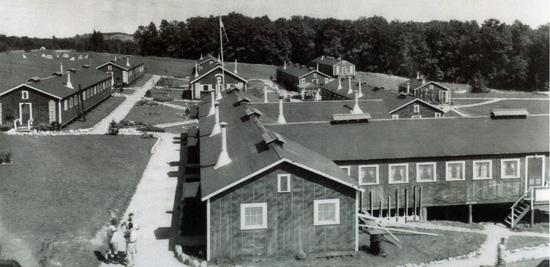
Pokagon State Park CCC Camp, 1938
The Civilian Conservation Corps
After the start of the economic catastrophe known as the Great Depression, Franklin Delano Roosevelt was elected president, bringing promises of a New Deal. This was a grand plan to fix the economic problems that caused the Great Depression, and that were caused by it. Historians refer to the three R’s the New Deal sought: relief, recovery and reform.
The Civilian Conservation Corps was among the first of the New Deal programs Roosevelt established upon assuming the presidency in March of 1933. The CCC was designed as a work program for young men from age18 to 25. The young men signed up for a renewable six-month term in which they would work on projects mostly related to land management and park construction. They received a $30 per month stipend, $25 of which was sent home to their families.
This $5 per month in the pockets of the CCC men had a positive impact on local economies. In the town of Fremont, near Pokagon State Park, some locals once complained about the presence of the CCC men in town on weekends. The leader of the CCC camp responded by paying the workers in dollar coins. He then asked one of the local merchants who had issued a complaint a question: Just how full was his cash register was with these dollar coins? It was so full he couldn’t close it. The CCC men were in town spending their money hand over fist. This helped change the attitude of the locals about the presence of the CCC.
The story of the 517th Company of the CCC: African Americans in Indiana's Civilian Conservation Corps.
Read newsletters from the CCC companies at Pokagon State Park and Indiana Dunes State Park:
- Hoosier Dunesman - July 18, 1934
- Pokagon Chieftain - January 21, 1936
- Pokagon Chieftain - August 14, 1934
- Pokagon Chieftain - August 31, 1934
- Pokagon Chieftain - September 17, 1934
These documents may contain some offensive language or negative stereotypes. You should view these materials in the historical context in which they were created. The ideas expressed within any given text do not necessarily reflect the views of the IDNR.


